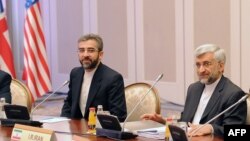Talks between world powers and Iranian officials seeking to find a resolution to Iran's controversial disputed nuclear program showed little signs of progress Friday.
A Western diplomat requesting anonymity said during the opening day of talks in Almaty, Kazakhstan that Iran failed to deliver "a clear and concrete response" to the offer made by the so-called P5+1 group of nations during the last nuclear negotiations in February.
Those proposals included Iran closing a nuclear facility and getting rid of its stockpile of enriched uranium in exchange for permission to trade some products now under international sanctions.
The diplomat said Tehran instead repeated proposals it made last year in Moscow during talks that ended without an agreement.
The two-day discussions include the five permanent members of the U.N. Security Council, plus Germany and Iran.
On Thursday, Iran's chief nuclear negotiator, Saeed Jalili, demanded that world powers recognize an Iranian right to enrich uranium.
On Friday, the Reuters news agency reported that Iran was seeking a new "framework" for the talks. Iran's deputy negotiator, Ali Bagheri, told the agency Tehran had made "specific proposals... for the start of a new round of cooperation."
But Western diplomats told reporters that Iran's response remains unclear.
The United States and its allies accuse Iran of amassing highly-enriched uranium as part of a covert drive to make nuclear bombs. Tehran insists its nuclear program is peaceful.
A senior U.S. official said Wednesday the world powers want Iran to give a "concrete and substantive" response to their proposal.
The U.S. official reiterated that President Barack Obama prefers diplomacy, but is leaving "all options" on the table to deal with the situation.
A Western diplomat requesting anonymity said during the opening day of talks in Almaty, Kazakhstan that Iran failed to deliver "a clear and concrete response" to the offer made by the so-called P5+1 group of nations during the last nuclear negotiations in February.
Those proposals included Iran closing a nuclear facility and getting rid of its stockpile of enriched uranium in exchange for permission to trade some products now under international sanctions.
The diplomat said Tehran instead repeated proposals it made last year in Moscow during talks that ended without an agreement.
The two-day discussions include the five permanent members of the U.N. Security Council, plus Germany and Iran.
On Thursday, Iran's chief nuclear negotiator, Saeed Jalili, demanded that world powers recognize an Iranian right to enrich uranium.
On Friday, the Reuters news agency reported that Iran was seeking a new "framework" for the talks. Iran's deputy negotiator, Ali Bagheri, told the agency Tehran had made "specific proposals... for the start of a new round of cooperation."
But Western diplomats told reporters that Iran's response remains unclear.
The United States and its allies accuse Iran of amassing highly-enriched uranium as part of a covert drive to make nuclear bombs. Tehran insists its nuclear program is peaceful.
A senior U.S. official said Wednesday the world powers want Iran to give a "concrete and substantive" response to their proposal.
The U.S. official reiterated that President Barack Obama prefers diplomacy, but is leaving "all options" on the table to deal with the situation.





